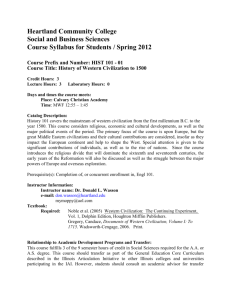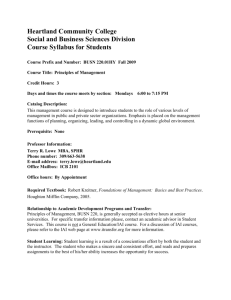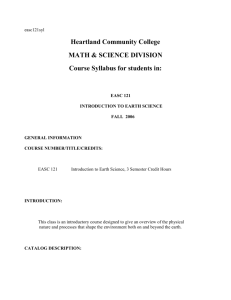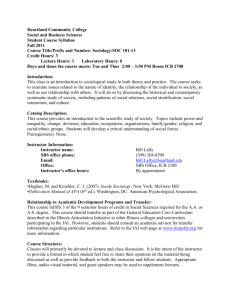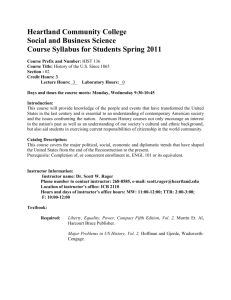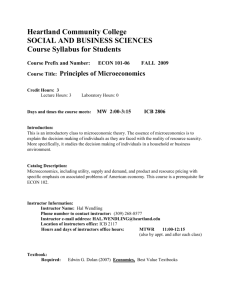BUSN 230 91 LOWE SP 13
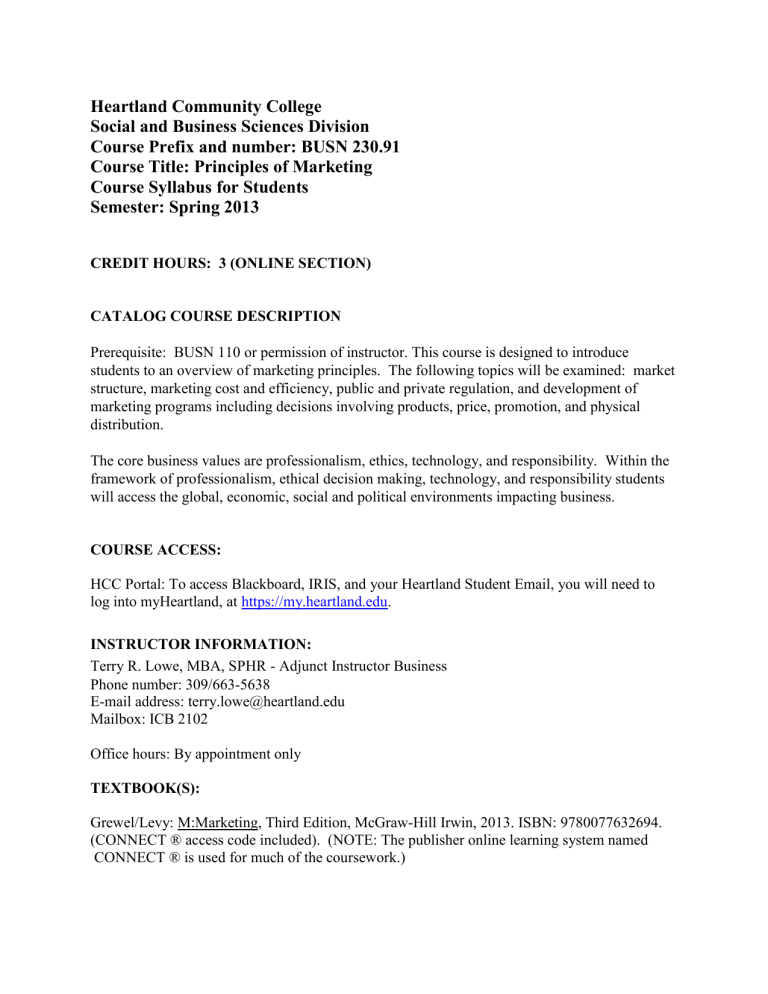
Heartland Community College
Social and Business Sciences Division
Course Prefix and number: BUSN 230.91
Course Title: Principles of Marketing
Course Syllabus for Students
Semester: Spring 2013
CREDIT HOURS: 3 (ONLINE SECTION)
CATALOG COURSE DESCRIPTION
Prerequisite: BUSN 110 or permission of instructor. This course is designed to introduce students to an overview of marketing principles. The following topics will be examined: market structure, marketing cost and efficiency, public and private regulation, and development of marketing programs including decisions involving products, price, promotion, and physical distribution.
The core business values are professionalism, ethics, technology, and responsibility. Within the framework of professionalism, ethical decision making, technology, and responsibility students will access the global, economic, social and political environments impacting business.
COURSE ACCESS:
HCC Portal: To access Blackboard, IRIS, and your Heartland Student Email, you will need to log into myHeartland, at https://my.heartland.edu
.
INSTRUCTOR INFORMATION:
Terry R. Lowe, MBA, SPHR - Adjunct Instructor Business
Phone number: 309/663-5638
E-mail address: terry.lowe@heartland.edu
Mailbox: ICB 2102
Office hours: By appointment only
TEXTBOOK(S):
Grewel/Levy: M:Marketing, Third Edition, McGraw-Hill Irwin, 2013. ISBN: 9780077632694.
(CONNECT ® access code included). (NOTE: The publisher online learning system named
CONNECT ® is used for much of the coursework.)
RELATIONSHIP TO ACADEMIC DEVELOPMENT PROGRAMS AND
TRANSFERABILITY:
This course fulfills 3 semester hours of elective credit for the A.A., A.S, or A.A.S. degrees. It should transfer to most colleges and universities as an elective course. However, since it is not part of either the General Education Core Curriculum or a baccalaureate major program described in the Illinois Articulation Initiative, students should check with an academic advisor for information about its transferability to other institutions. Refer to the IAI web page at www.itransfer.org for more information.
COURSE LEARNING OUTCOMES: Upon completion of this course, students will be able to:
OUTCOMES GENERAL
EDUCATION
OUTCOMES
RANGE OF
ASSESSMENT
METHODS
1. Define marketing and understand the significance of the marketing concept.
2. Evaluate the factors that impact the decisions regarding product, price, promotion, and physical distribution for a product or service.
3. Predict why consumers behave the way they do in the market place by purchasing certain products; develop insights into consumer motivation, perception, learning, and attitudes.
4. Forecast demand for products and services based on geographic, demographic, psychographic, and behavioral variables.
Communication and
Critical Thinking
Critical Thinking and Diversity
Problem Solving
Exams and quizzes; experiential exercises; projects.
Exams and quizzes; experiential exercises; projects.
Exams and quizzes; experiential exercises; projects.
Experiential exercises, projects.
5. Demonstrate how products are designed, named, packaged and formed into lines to conform to or develop consumers’ attitudes and existing beliefs.
Critical Thinking Exams and quizzes; experiential exercises; projects.
6. Analyze how economic factors such as price elasticity of demand, the various costs facing the company, and psychological factors impact pricing decisions.
Critical Thinking Exams and quizzes; experiential exercises; projects.
Additional information regarding the College learning outcomes can be found on the HCC website: http://www.heartland.edu/committees/assessment/genedoutcomes.html
COURSE/LAB OUTLINE:
1. Marketing concept
2. Market strategy and planning
3. Market research and information systems
4. Consumer and organizational buying behavior
5. Demographics and psychographics
6. Market segmentation and product positioning
7. Competitive advantages
8. Product design and product mixes
9. Social and non product marketing
10. New product marketing strategies
11. Brand recognition and loyalty
12. Pricing strategies
13. Wholesaling, retailing, and channels of distribution
14. Product packaging and advertising
15. Personal selling and sales promotion
16. Direct marketing
METHODS OF INSTRUCTION:
Rational For Course Content:
All topics discussed and assigned are designed to enhance the student's knowledge of the role of marketing in the business organization. The content in this course will provide both the student transferring to an upper division school of business, and the student directly entering the work force with the tools necessary to both identify and participate in effective marketing practices.
Description Of Learning Format:
The student should follow this procedure for each week: a. b. c. d.
Check the course calendar frequently and develop a study plan each week.
Read or scan the required textbook pages.
Utilize online materials.
Complete and submit assignments before deadlines. e. Ask for clarifications of readings and assignments when needed. f. Access the course several times each week to check for announcements or updates.
METHODS OF EVALUATION:
CONNECT Exams % X 300 300 points (Exams and Quizzes 30%)
CONNECT Quizzes % X 200 200 points (Exams and Quizzes 20%)
CONNECT Homework % X 200 150 points (Experiential Exercises 15%)
Course Activities including Discussions and other experiential assignments not included in CONNECT
150 points (Experiential Exercises 15%)
(2) Mini Projects @ 50 points each 100 points (Projects 10%)
Course Project 100 points (Projects 10%)
TOTAL POINTS 1000 points
Letter grades will be based on the points earned in the course in accordance with following scale:
A 900 to 1000
B 800 to 899
C 700 to 799
D 600 to 699
F 0 to 599
The instructor will determine if any downward adjustment of the above scale is warranted after all assignments are graded.
THERE IS NO EXTRA CREDIT AND NO LATE WORK ALLOWANCES. (STUDENTS
WHO FIND THEMSELVES IN A LONG TERM ABSENCE SITUATION SUCH AS
PERSONAL ACCIDENT/ILLNESS OR FAMILY SITUATIONS SHOULD CONTACT THE
INSTRUCTOR ON COURSE CONTINUANCE OPTIONS AND DOCUMENTATION
PROCEUDRES.)
Incompletes:
An incomplete grade may be given to a student who, by the withdrawal date, can reasonably be expected to pass the course. Incompletes may be granted only when justified by extreme circumstances ( e.g
., serious illness, accident, death or serious illness in the immediate family).
Incomplete grades are not given for such reasons as unjustified failure to appear for the final examination. The instructor and the student must sign a written agreement outlining the requirements to be met. The agreed upon requirements must be completed no later than the end of the following semester (spring semester for incompletes granted during the fall, and the following fall for incompletes given during the spring and summer semesters).By the agreed upon date, the instructor will assign a grade or the incomplete will be changed to an F if the requirements are not completed.
Philosophy of Grades
The Heartland Community College grading philosophy grows out of our vision of educational excellence. This common philosophy provides a framework for each academic division and instructor as they establish their own individual course grading system, evaluation methods, and course policies using the shared general rubrics for letter grades given below.
Letter grades serve as a vehicle to promote meaningful evaluation of student achievement, to inform students of academic progress, and, as necessary, to improve student performance, habits, and practices. Using a letter grade as a prerequisite for
subsequent courses means we believe that the grade was assigned through a conscious judgment about a student’s readiness to proceed to more advanced study.
At Heartland, students’ academic achievement is measured by their mastery of course objectives and content. We challenge students to meet these recognized standards of achievement and we assign grades based on their success in doing so. Simply stated, we believe that the responsibility for academic achievement rests with the student and that holding students responsible for their learning promotes their academic growth.
Letter Grade Rubrics
“A” This grade represents consistently outstanding performance that demonstrates superior understanding and skillful use of important course concepts. Performance at this level signifies that the student is extremely well prepared to continue with more advanced study of the subject.
“B” This grade represents performance significantly beyond the level necessary to achieve the course objectives. Work is of high quality but not consistently at an outstanding level. Performance at this level signifies that the student is well prepared to continue with more advanced study of the subject.
“C” This grade represents an acceptable achievement of the course objectives.
Performance at this level signifies that the student is reasonably well prepared to continue with more advanced study of the subject.
“D” This grade represents less than adequate performance. It signifies questionable readiness to proceed with more advanced study of the subject.
“F” This grade reflects unacceptable performance. The student is not yet ready to proceed with more advanced study of the subject, and must repeat the course successfully to receive credit.
REQUIRED WRITING AND READING:
Students should read the required chapters and materials as indicated in the course calendar.
A minimum of ten pages of college level writing is required in this course. All written assignments are designed to enhance the student’s writing skills and critical thinking skills.
Students will be required to connect with contemporary issues in business through reading of online or print materials with critical analysis connecting to theoretical concepts. Extensive writing and commentary on topics will be utilized through experiential cases and project assignments.
The two mini projects and the major course project, taken together, will require about 15 pages of writing.
ACADEMIC INTEGRITY AND PLAGIARISM:
Academic Integrity
Academic integrity is a fundamental principle of collegial life at Heartland Community College and is essential to the credibility of the College’s educational programs. Moreover, because grading may be competitive, students who misrepresent their academic work violate the right of their fellow students. The College, therefore, views any act of academic dishonest as a serious offense requiring disciplinary measures, including course failure, suspension, and even expulsion from the College. In addition, an act of academic dishonesty may have unforeseen effects far beyond any officially imposed penalties.
Violations of academic integrity include, but are not limited to cheating, aiding or suborning cheating or other acts of academic dishonesty, plagiarism, misrepresentation of data, falsification of academic records or documents and unauthorized access to computerized academic or administrative records or systems. Definitions of these violations may be found in the college catalog.
Plagiarism
Plagiarism is the presenting of others’ ideas as if they were your own. When you write a paper, create a project, do a presentation or create anything original, it is assumed that all the work, except for that which is attributed to another author or creator, is your own. Plagiarism is considered a serious academic offense and may take the following forms:
Copying word-for-word from another source and not giving that source credit.
Paraphrasing the work of another and not giving that source credit.
Adopting a particularly apt phrase as your own.
Using an image or a copy of an image without crediting its source.
Paraphrasing someone else’s line of thinking in the development of a topic as if it were your own.
Using another person’s project or another person’s work as if it were your own.
[Adapted from the Modem Language Association’s MLA Handbook for Writers of Research
Papers. 7 th
ed. New York: MLA, 2009:51-61]
Note that word-for-word copying is not the only form of plagiarism. The penalties for plagiarism may be severe, ranging from failure on the particular piece of work, failure in the course or expulsion from school in extreme cases.
Many plagiarism problems can be remedied by citing the sources of the original work.
When in doubt, cite the source according to the style your instructor directs. Usually this is APA or MLA Style. Don’t be daunted by citing sources which are not books. You can cite everything, including pamphlets, maps, cereal boxes, telephone conversations, movies, television shows, Internet and world-wide web sites.
GENERAL INFORMATION FOR STUDENTS:
Testing Services (located in Student Commons Building 2001)
Testing Services provides a secure testing environment for students who are enrolled in online, hybrid, and other distance learning courses; have a documented disability; or need to take a make-up exam. Testing accommodations for students having documented disabilities must be arranged by the student through Disability Support Services. Testing Services will only administer exams at the request of the instructor. For more information, please call (309) 268-
8050.
Counseling Services
Counseling Services provides confidential and professional counseling for both emergency and personal issues. Services also include referrals to local community resources and support for students on academic probation. For more information, please call (309) 268-8318.
Services in Academic Support Center (Raab Road campus)
Library
The Library provides fast and free access to credible information from a full range of resources including books, online journals, videos, newspapers, online music, class reserves, and interlibrary loan. Individualize research by appointment or come in anytime. See the Library tab in myHeartland, email library@heartland.edu
or call (309) 268-8292 for details.
Tutoring Services
Tutoring Services provides tutoring in various forms at no cost to Heartland students in Normal,
Pontiac, and Lincoln. Tutors are available at convenient times throughout the week. Study groups are also available by request. For more information about services available at each location, please call (309) 268-8231 (Normal), (815) 842-6777 (Pontiac), or (217) 735-1731
(Lincoln).
Disability Support Services
Disability Support Services (DSS) ensures that students with disabilities have equal access to the college’s programs, services and activities through the provision of reasonable accommodations as mandated in Section 504 of the Rehabilitation Act and the Americans with Disabilities Act.
DSS offers a wide range of services to support students with disabilities, including: assistive technology, document conversion services, personnel, classroom and testing accommodations.
Students with a documented disability who wish to discuss academic accommodations should call (309) 268-8259 for details.
Open Computing Lab
The Open Computing Lab provides free computing for HCC students at convenient times throughout the week. The computer lab is staffed by trained Lab Assistants and offers the use of approximately 70 computers, a scanner, a laser printer, and an electric typewriter.
Writing Lab
The Writing Lab provides guidance for writers on assignment comprehension, critical thinking and the stages of the writing process. The Writing Lab is staffed by English faculty and Tutors with years of experience working with students on writing. In every session, supportive staff work with writers to explore and develop their own ideas as appropriate to the needs of their readers and to learn the rhetorical strategies necessary for effective communication. For more information, please call (309) 268-8231.
Services in Community Commons Building, first floor (Raab Road campus)
Academic Advising
Academic advisors help students develop a plan of study, review degree/program requirements, discuss transferability of courses, and provide career exploration support. For more information, please call (309) 268-8033 . Academic Advising services are also available at the Lincoln and
Pontiac sites.
Career Services
Career Services assist students to determine career goals, develop employability and job search skills and connect with potential employers in preparation for employment and career transitions. Through the Online Career Center at www.collegecentral.com/heartland students can learn about area employment opportunities, prepare and post resumes and find a host of free career-related resources. The job shadow and internship programs offer access to relevant workbased learning opportunities that enhance academic experiences and support students in their career pursuits. For more information, please call (309) 268-8034 or email
Career.Services@heartland.edu
.
Financial Aid Office
The Financial Aid Office provides information on programs and types of financial aid available to students. For more information, please call (309) 268-8020.
Transcripts (Located in Student Commons Building 1000)
Official and unofficial transcripts may be obtained in the Student Records Office. Transcripts may also be obtained at Heartland’s Lincoln and Pontiac sites. Official transcripts must be requested in writing. The form is available online
( http://www.heartland.edu/transcripts/index.jsp
) or in the Student Records Office. Unofficial transcripts are available to print online through IRIS.
DUE DATE
January 20
January 27
February 3
February 10
February 17
February 24
March 3
March 10
March 24
March 31
April 7
April 14
April 21
COURSE CALENDAR
Principles of Marketing
Spring 2013
TOPIC(S) MODULE(S) DUE
Course Introduction Orientation Module
Marketing Concept
Marketing Strategy and Planning;
Competitive
Advantages
Marketing Ethics and
Marketing
Environment;
Demographics and
Psychographics
Consumer and
Organizational
Buying Behavior
Exam 1
Global Marketing
Market Research and
Information Systems;
Market Segmentation and Product
Positioning
Brand Recognition and Loyalty
Product Design and
Product Mixes; New
Product Marketing
Strategies
Exam 2
Pricing Strategies
Wholesaling,
Retailing, and
Channels of
Distribution
Module 1
Module 2
Module 3
Module 4
Module 5
Module 6 and Module 7
Module 8
Module 9
Module 10 and Module 11
Module 12
Module 13
Module 14
April 28
May 5
May 12
May 16
Direct Marketing
Social and Non-
Product Marketing;
Product Packaging and Advertising;
Personal Selling and
Sales Promotion
Marketing Project
Exam 3
Module 15
Module 16
Module 17
Module 18
